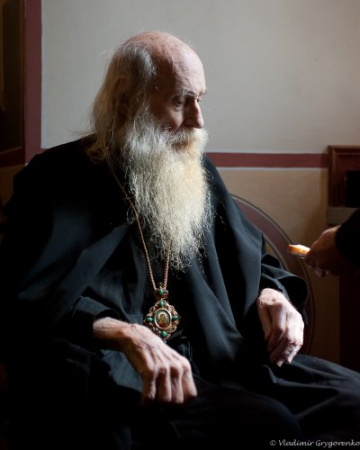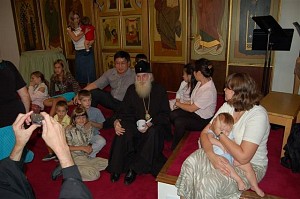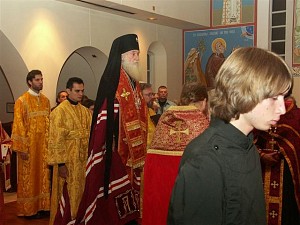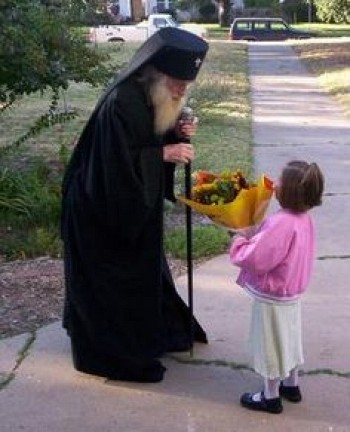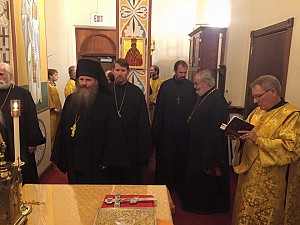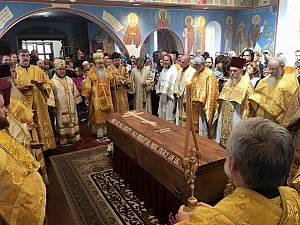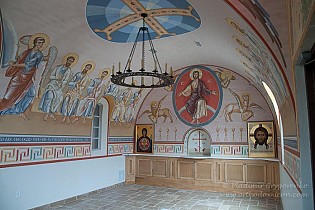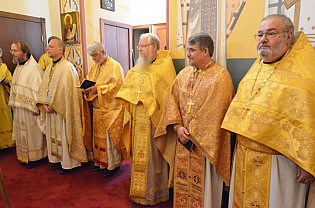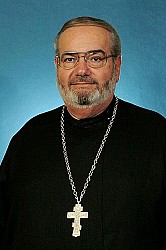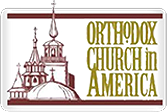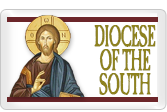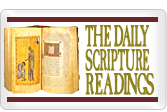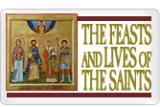ARCHBISHOP DMITRI REINTERRED AT THE DALLAS CATHEDRAL
On Friday, March 4th His Eminence Archbishop Dmitri's coffin was exhumed from the grave where it had been buried four and one half years ago. To the surprise of only those who had not known him the body was found to be intact and incorrupt. It was then revested, placed in a new wooden coffin and brought to the St. Seraphim Cathedral in Dallas. That evening vespers and a Panikhida (prayer service for the departed) were prayed with Metropolitan Tikhon as main celebrant. The next morning a Hierarchical Divine Liturgy was celebrated and a second Panikhida prayed. Fr. Joseph was blessed to be one of the concelebrating priests. The coffin was then carried by six priests in solemn procession around the cathedral, into the chapel that had been built to accommodate the Archbishop's remains. It was then lowered into the crypt beneath the floor. The relics of him who many believe to be and venerate as a saint were now in their proper place
A BRIEF BIOGRAPHY OF THE HOLY ARCHBISHOP DMITRI
DEPARTED ARCHBISHOP OF DALLAS AND THE DIOCESE OF THE SOUTH
His Eminence was born Robert R. Royster on November 2, 1923, into a Baptist family in the town of Teague, Texas. He often credited his mother for providing him and his sister with a strong, initial faith in Christ. After discovering Orthodoxy as teens they asked their mother for a blessing to convert, whereupon she asked one question: "Does the Orthodox Church believe in Christ as Lord and Savior?" As it turned out, a specific emphasis on the person and work of Jesus Christ became the hallmark of the future hierarch's ministry profoundly influencing his preaching and writing.
Having received their desired blessing, and after a period of inquiry and study, brother and sister were received together as Orthodox Christians at Holy Trinity Greek Orthodox Church in Dallas, Texas in 1941. It was at that point that the two received the names of Dmitri and Dimitra.
Dmitri was drafted into the US Army in 1943, after intensive training in Japanese and linguistics he served as a Japanese interpreter at the rank of Second Lieutenant on the staff of General Douglas MacArthur. After his military service Dmitri completed his education, receiving a Bachelor's Degree from the (now) University of North Texas in Denton and a Master's Degree in Spanish in 1949 from Southern Methodist University. He completed two years of post graduate studies at Tulane University in New Orleans whereupon he returned to his home in Dallas.
In April of 1954 (At this time a Subdeacon), Dmitri, his sister Dimitra and their priest, Fr. Rangel sought permission of the local hierarch, Bishop Bogdan, to establish an English language Orthodox mission in Dallas, the future St. Seraphim Cathedral. Dmitri was ordained to the diaconate and priesthood that same year and assigned as rector of St. Seraphim's. In 1958 permission was sought and given to bring both Fr. Dmitri and the parish into the Russian Metropolia, predecessor to the Orthodox Church in America. During his pastorate Fr. Dmitri served as an instructor of Spanish at Southern Methodist University.
From 1966 to 1967 Fr. Dmitri attended St. Vladimir's Orthodox Seminary in New York while concurrently teaching Spanish at Fordham University. In 1969 Fr. Dmitri was elected to the episcopate. On June 22 of that year he was consecrated Bishop of Berkeley, California as an auxiliary to Archbishop John (Shahovskoy) of San Francisco. In 1970 Bishop Dmitri was given the title, Bishop of Washington, auxiliary to Metropolitan Ireney.
On October 19, 1971, Bishop Dmitri was elected Bishop of Hartford and New England. In 1972 the Holy Synod of Bishops brought Mexico under the auspices of the Orthodox Church in America, which had received its autocephaly (the right to govern itself) in 1970 from the Moscow Patriarchate. Given his knowledge of and fondness for Mexican culture and the Spanish language, Bishop Dmitri took on additional responsibilities from the Holy Synod as Exarch of Mexico. He was as much beloved by the Mexican people as by those in his own Diocese.
In 1977 at the 5th All American Council convened in Montreal, Bishop Dmitri received a majority of popular votes in an election for a new Metropolitan of the Orthodox Church in America. For the sake of continuity -- a cradle Orthodox occupying the Primatial See was felt to be more in keeping with the contemporary challenges of a young territorial Church -- the Holy Synod chose instead The Right Reverend Theodosius (Lazor), Bishop of Alaska.
In 1978 the Synod of Bishops created the Diocese of Dallas and the South. His Eminence became its first ruling hierarch, taking St. Seraphim Church as his Episcopal See. Christ the Saviour Church in Miami, Florida, a prominent Orthodox community in the South, became the second Cathedral of the newly formed Diocese. Bishop Dmitri assisted by Archpriest George Gladky, a veteran missionary established Churches and taught Orthodoxy in a region of America where Orthodox Christianity was relatively unknown. The first Diocesan Assembly of the South was convened in Miami, August 25-26, 1978.
In 1993 the Holy Synod elevated Bishop Dmitri to the rank of Archbishop. On September 4, 2008, following the retirement of Metropolitan Herman, the Holy Synod named Archbishop Dmitri as the locum tenens of the Orthodox Church in America. Archbishop Seraphim (Storheim) assisted him as administrator. In November of 2008, Archbishop Dmitri's role as OCA locum tenens ended with the election of Bishop Jonah (Paffhausen) of Fort Worth as Metropolitan. On March 22, 2009, the Archbishop requested retirement from active duty as a Diocesan Bishop effective March 31, 2009. In retirement he remained active especially continuing his acclaimed scriptural commentaries. (His commentary on the Gospel of St. John was published posthumously in the summer of 2015.)
On August 28, 2011, the beloved Archbishop Dmitri peacefully fell asleep in the Lord, attended by priests and laity.
Archbishop Dmitri of blessed memory was much loved by his flock and the priests that served under him. Always referred to by his priests as Vladyka, a Russian term of endearment for one’s bishop, he led in fatherly love and by humble example. As one priest summed it up at his reinterment, “We obeyed not so much because he commanded us but because he loved us.
For his former Diocese and the Orthodox Church in America, His Eminence leaves behind a progressive vision of evangelism and ecclesial life, a solid foundation upon which to develop future communities and schools. He leaves the faithful the experience of having had a compassionate father whose enthusiasm was contagious, inspiring many to look profoundly at their own vocations in the Church.
Archbishop Dmitri's episcopacy was strongly characterized by a single-minded devotion to the person and work of Jesus Christ. His publications are testimony to this dedication. They include commentaries on: The Sermon on the Mount, The Parables of Christ, The Miracles of Christ, St. Paul's Epistles to the Romans and to the Hebrews, The Epistle of St. James, and the Gospel of St. John. His works also include the aforementioned Introduction to Orthodox Christian Teaching, as well as A Layman's Handbook on The Doctrine of Christ. Some of these have been translated into other languages.
The dignity that he brought to his episcopacy was well known. People commented on his bearing, the way he carried himself as a bishop of the Orthodox Church. Some found it surprising that such an august figure possessed great love and respect for others, that he presented himself as one of the people.
Without exaggeration it can be said that His Eminence was a rarity, a unique combination of faith, talent, intelligence and charisma. For the Diocese of the South, indeed for the Orthodox Church in America, he was the right person at the right time.
Forty- two years a bishop, each day offered in service to Christ with Whom he now enjoys the blessedness of the Kingdom. We pray for his continued prayers and we thank the Lord for having given His flock the gift of Archbishop Dmitri. May his Memory Be Eternal.
"Remember those who rule over you, who have spoken the Word of God to you, whose faith follow, considering the outcome of their conduct" (Hebrews 13:7).
"For though you might have ten thousand instructors in Christ, yet you do not have many fathers; for in Christ Jesus I have begotten you through the gospel..." (I Corinthians 4: 15)

